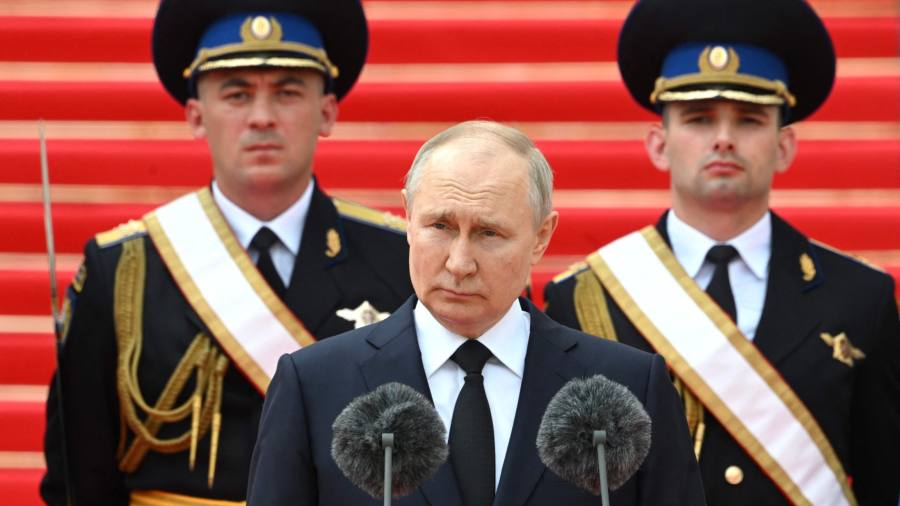
Receive free War in Ukraine updates
We’ll send you a myFT Daily Digest email rounding up the latest War in Ukraine news every morning.
Vladimir Putin’s strategy in Ukraine seems to be based on the belief that he can outlast the west. Western support for Kyiv will inevitably wane with time, runs the Kremlin’s logic, while Moscow’s determination to reconquer what it sees as Russian lands makes it readier to endure losses. Instead, the Russian leader is now scrambling to shore up his authority after last weekend’s aborted armed rebellion by the warlord Yevgeny Prigozhin. The mere fact Putin was openly challenged by a man who was his own creation has dimmed his aura of invulnerability. The west should seek to take advantage of the confusion in Moscow, and accelerate its support for Kyiv.
That means, first of all, not reacting in the wrong way to the weekend’s events. As Prigozhin advanced towards Moscow with an armed brigade, the world briefly peered into an abyss of instability and potential civil war in a country with 6,000 nuclear warheads. Though it seemed unlikely the militia boss would prevail, his mutiny also highlighted the possibility of Putin being replaced by an even more vicious nationalist. Some western capitals may be tempted to seek a negotiated end to the Ukraine war sooner rather than later.
Yet Putin is himself a highly dangerous leader. He has launched Europe’s largest war since the second world war, trampled on international norms, and overseen war crimes. He has broken taboos on nuclear sabre-rattling. Pushing Kyiv to make a premature “peace” that allowed Putin to retain most of his military gains might only embolden him to launch new assaults against Ukraine, or elsewhere, in the future.
Some influential voices on both sides of the Atlantic also argue that stepped-up aid by the US and Europe could prompt a panicky Kremlin to escalate. Even before the uprising, some of Russia’s best-known foreign policy analysts had begun to advocate Russian use of a nuclear weapon against a European target beyond Ukraine, to force the west to back down.
The west has its own tools of deterrence, however, and should amplify the messages it is understood to have delivered privately last year about the devastating consequences should Moscow cross the nuclear threshold. One lesson of his response to the mutiny is that the Russian leader seems to balk at actions that could endanger his own survival. And those who have dealt with him say he exhibits the morality of a mobster, exploiting any hint of weakness and heeding only toughness.
Western leaders must prepare for the possibility of further instability in Moscow, whatever action they take now. But Putin’s apparent fragility is a moment to display greater resolve. The more support Ukraine receives today, the better its chance of making substantive progress before the next US election cycle. The more chance it then has of strengthening its own negotiating hand and of bringing the Kremlin to the table on Kyiv’s terms, especially if Russia’s leader begins to doubt his ability to withstand a long war.
Ukraine’s allies should speed up supplies of ammunition and of long-range missiles, now that the UK has begun deliveries. With seven EU members of Nato committed to providing western fighter planes and to training Ukrainian pilots, preparations should be accelerated to plug what is a key gap in Ukraine’s counteroffensive.
Western leaders also need to send the right message at next month’s Nato summit in Vilnius, particularly the wavering Biden administration. They should show they are ready to provide future security guarantees to Kyiv against aggression by Moscow, and put it on a credible road to Nato membership once the war is over and it meets requirements. Doing less would be a boost for Putin, just when he is down.